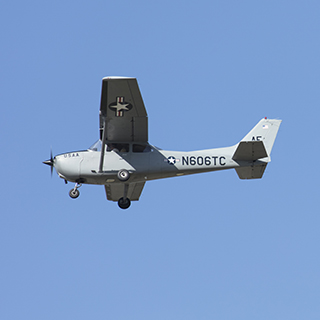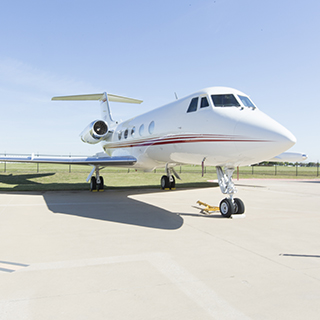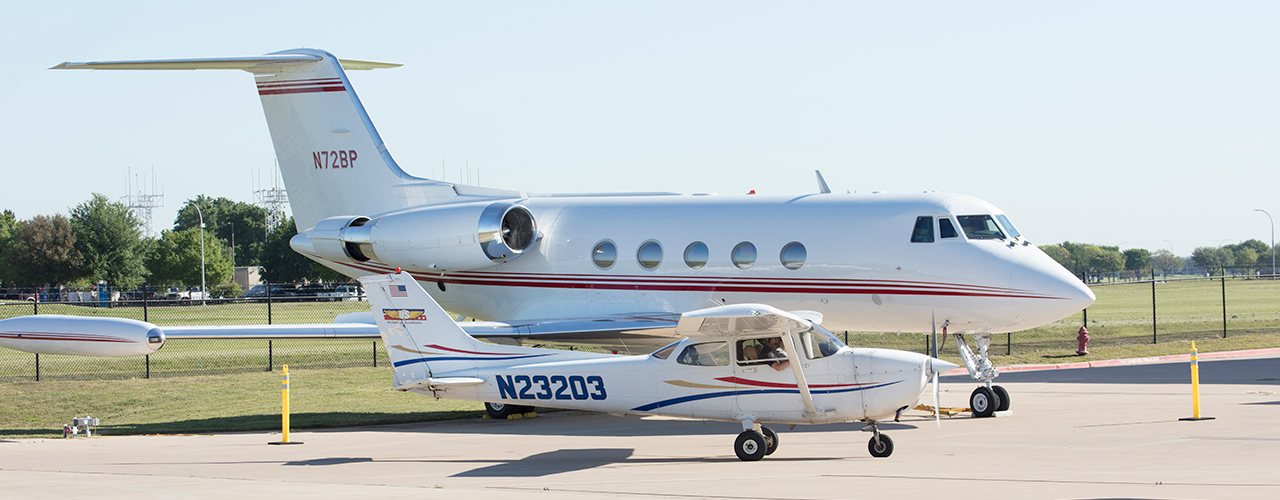Preparing for Takeoff
TCC Aviation Program Offers Flight Path to the Cockpit
After spending 10 years inspecting and working on fixed-wing aircraft and large turbine engines as an aircraft mechanic in the U.S. Marine Corps, Drew Smith dreamt of manning his own cockpit. He searched for a program that helped train veterans to become professional pilots.
“I had zero knowledge of being a pilot,” said Smith. “I did come from a maintenance background being in the U.S. Marines Corps where I worked on aircraft, but as far as flying them, I had no experience whatsoever,” said Smith. “So, I came to TCC as fresh as could be.”
 A month after leaving the Marine Corps in 2015, Smith enrolled in the Professional
Pilot Program at TCC to pursue an Associate of Applied Science in Aviation Technology
and two certificates (commercial pilot and flight instructor). The full program, which
features a Federal Aviation Administration (FAA) Part 141-approved flight training
curriculum, is offered at the Erma C. Johnson Hadley Center of Excellence for Aviation,
Transportation and Logistics at the TCC Northwest Campus at Alliance Airport.
A month after leaving the Marine Corps in 2015, Smith enrolled in the Professional
Pilot Program at TCC to pursue an Associate of Applied Science in Aviation Technology
and two certificates (commercial pilot and flight instructor). The full program, which
features a Federal Aviation Administration (FAA) Part 141-approved flight training
curriculum, is offered at the Erma C. Johnson Hadley Center of Excellence for Aviation,
Transportation and Logistics at the TCC Northwest Campus at Alliance Airport.
The former Marine expected the two-year program to offer a certain level of academic rigor. Smith, however, never envisioned his post-military career being so challenging. “By far this was the hardest, in the mental capacity, that I’ve ever had to deal with,” he shared. “I’m not joking when I say that I woke up at six in the morning to study and read all day until 10 o’clock at night.” Smith went on to say students are tested on a weekly basis, and all scores must be an 80 or above to pass. “If you don’t make a high grade, you won’t make it.”
Smith was a dedicated student, even taking classes during the summer to graduate quicker. The hard work paid off as U.S. Aviation in Denton offered him a job last year, just weeks before graduation. As a flight instructor today, Smith is training future pilots and building his own flight time as a way of taking his aviation career to new heights.
“My overall dream, since I am a helicopter pilot, is to work in the utility world, meaning firefighting, construction and also in emergency medical services as a CareFlite-type of pilot,” explained Smith. “I want to touch all of those fields in the long term.” At some point, Smith plans to get his “fixed-wing” certification to boost his earning potential.
Holders of “fixed-wing” certifications typically pursue careers as a commercial airline pilot, usually starting at regional carriers to accrue flight hours. For those looking to become commercial airline pilots, TCC is an excellent place to start.
 Launched in 2014 with only 18 students, the program currently has more than 290 students
pursuing a degree or certificate, with about half receiving some type of veteran benefit.
Since the program’s inception, TCC has awarded nine Associate of Applied Science degrees
in Aviation Technology – Professional Pilot, 13 Commercial Pilot Certificates and
three Certificates of Enhanced Skills for Flight Instructors.
Launched in 2014 with only 18 students, the program currently has more than 290 students
pursuing a degree or certificate, with about half receiving some type of veteran benefit.
Since the program’s inception, TCC has awarded nine Associate of Applied Science degrees
in Aviation Technology – Professional Pilot, 13 Commercial Pilot Certificates and
three Certificates of Enhanced Skills for Flight Instructors.
This program is one of seven non-profit flight programs in Texas and the only Part-141 program in North Central Texas authorized to certify graduates with eligibility for the Restricted Airline Transport Pilot Certification (ATP) by the Federal Aviation Certification. This allows TCC students to apply for the ATP Certification at 1,250 flight hours and 21 years of age, saving students 250 flight hours in their quest to become eligible to fly as a commercial airline pilot. TCC is one of only five programs in Texas and one of 80 in the nation to receive this distinction.
According to Chad Weigand, chair for the Professional Pilot Program, two graduates are already flying for Envoy Air, the largest regional air carrier for American Airlines. Average starting salaries for regional airline pilots are roughly $45,000 to $55,000 plus bonuses. This is a necessary first step for pilots looking to fly for a major airline carrier.
The combination of a growing airline industry, a wave of retirements by major airline pilots beginning in 2021 and demand for regional flights has left airline carriers intensifying the search for young pilots to fill their cockpits. By 2036, approximately 640,000 new pilots will be needed to fly commercial airplanes worldwide, according to a recent Boeing report. The U.S. Bureau of Labor Statistics reported that commercial airline pilots, copilots and flight engineers earned an average of $127,820 in May 2016.
“Whatever the end goal, whether students follow the airplane or helicopter track, they will receive all the training necessary through TCC’s Professional Pilot Program to receive all the certification they need to get them headed in the right direction to achieving it,” said Weigand.
Flight instructors say students are getting younger and younger, and it’s not uncommon to see some area high school students taking flight in North Texas. “The partnership between Northwest ISD and Tarrant County College enables students to reach their dreams sooner, as opposed to getting into a plane after graduating high school,” said Donny Pharr, the Aviation and Aeronautics Academy Facilitator for Northwest ISD’s V.R. Eaton High School. Currently, the ISD has 90 students participating in the program, including nine girls.
This program reduces the number of hours needed to earn a professional pilot license and also reduces the age from 23 to 21, meaning they can go to work for the airlines two years sooner.
Donny Pharr
According to Pharr, Northwest ISD is the only public school district in the region that allows students to fly during school hours and earn both high school and college credits.
Students earning an associate degree from TCC now have an opportunity to use their training and experience toward a bachelor’s degree at the University of North Texas. “The articulation agreement between UNT and TCC is fairly simple -- it provides a path to a four-year degree for the TCC students that have an associate degree in either the pilot or aviation mechanic programs,” said Steve Joiner, UNT lecturer in aviation and former U.S. Marine Corps pilot. “The benefit for the pilot program at TCC is getting the newly rated pilot a bachelor’s degree, which is still preferred by airlines, with just two additional years. The student is therefore more hirable into the professional pilot ranks.”
Before enrolling in TCC’s Professional Pilot Program, Weigand encourages all prospective students to learn more about the financial commitment. In addition to tuition, which is $885 per 15-hour semester, there are additional costs for flight time and fuel.
TCC Commercial Pilot Certificate of Completion estimated flight fees:
- Airplane (Private through Commercial) – $44,600
- Helicopter (Private through Commercial) – $113,300
TCC Associate of Applied Science estimated flight fees:
- Airplane (Private through Multi-Engine Commercial plus CFI and CFII) – $64,200
- Helicopter (Private through Commercial plus CFI and CFII) – $139,100
To learn more about TCC’s Professional Pilot Program, visit Professional Pilot.


![//parameter[@name='author']](/magazine/assets/images/authors/reggie-lewis.jpg)